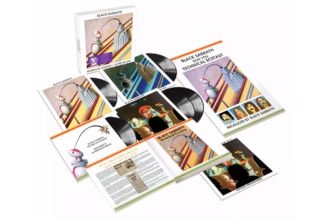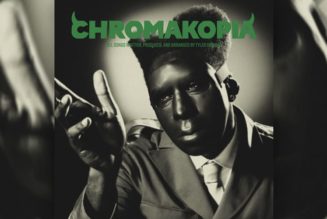
On Pray for Haiti’s opening song, “The 26th Letter,” Mach-Hommy raps about a sort of alchemy: “It’s crazy what y’all can do with some old Polo and ebonics.” The spectral Newark rapper’s work blurs the sounds and images of past lives, be they rap songs from his adolescence or his ancestors dating back generations. He will interpolate Get Rich or Die Tryin’ album cuts then slip into Haitian Creole, nod to ritualistic healing practices and then to Thirstin Howl III. His slang and diction shift depending on the narrator, depending on the mood, the beat, the threat or the plea being conveyed. His work is not designed to be decoded; its success does not hinge on the listener knowing which words or cadences are borrowed from Vol. 3 or Mm..Food?, or on the Creole being translated exactly. Mach reveals himself slowly, through allusion and immersion, an image loading grainily. Pray for Haiti is his most ambitious, definitive project since his 2016 masterpiece Haitian Body Odor, a collage rendered in full.
Pray for Haiti is a reunion with Westside Gunn, the Buffalo rapper whose Griselda collective included Mach before the two had a falling out. Gunn serves as executive producer and raps three times, though his added value is clearest when he shows up to ad-lib under Mach’s verses or talk neo-Puff shit between them. Mach has long been a chameleon, rapping or singing over some of the drumless loops that are a staple of the post-Marcberg underground, but also beats that are far more punishing, or far more maximal; the unifier has been a jagged mix. (On “Makrel Jaxon,” he speaks directly to that omnivorous streak: “Next tape might hear me sliding on flamenco/Or calypso/Maybe you should tip-toe.”) The beats he and Gunn have assembled here—mostly from Griselda mainstays like Cee Gee, Camoflauge Monk, and Denny Laflare, plus, notably, three in succession from Kansas City’s Conductor Williams—are varied enough to draw out of Mach each of his many styles: see “Magnum Band” and its low growl, the deceptively rich vocal arrangement on “Kriminel”’s chorus, the way “Makrel Jaxon” sounds like a copy of Donuts that was left out in the rain.
Broken into discrete parts, Mach’s rapped verses would seem more conventional than they end up being: They are full of de rigueur punchlines, clever similes that were once the default setting for East Coast rappers. Some of these are ordinary (“Got lawyers on retainer just like an orthodontist”) and others exceptional (“Lotta these rappers big 12 like March Madness”). But they are stitched together in strange ways and at unexpected times and delivered with a flat affect that draws attention to the fact that the punchline is being placed here, as if he’s creating his own source material to quote and interpolate. And then there’s the level of detail he brings to his records. Mach is worldly the way you imagine a spy would be, or at least upper management in a global oil conglomerate: He knows how to order coffee in Damascus and a hit in Paris, knows which local toughs to muscle out and which to charm into his service.
This caginess makes it even more arresting when Mach is totally earnest. On “Kriminel,” when he raps about being unable to eat and seeing visions in his sleep, the verse has a desperation deeper than what would be apparent on the page. That song, like many others, is augmented by his practiced, scratchy singing voice, a mode that Mach slips into not only to vary the textures but to provide a tonal break from the step-ahead slyness of his raps.
Pray for Haiti is 16 tracks, and its 13th is simply the audio from an academic discussion of Haitian Creole, where it is noted that speakers in one region of that country might use terminology that is totally foreign to speakers in another. The interlude underscores a central theme—Mach revels in specificity, and seems to enjoy that it makes his work elusive, even illegible to some—but it also serves a structural purpose on the album, cordoning off the final three songs as their own suite. This begins with the melancholy “Au Revoir,” where the material things Mach sometimes raps about so gleefully—the yachts, the “thousand-dollar brunches”—sound almost terrifyingly hollow. But he qualifies this tone, as he so often does, with the album’s closer, “Ten Boxes – Sin Eater,” where he cheekily conjures the image of a messiah resurrected “in Vetements linen.”
While his singing is a reliable vehicle for sorrow and longing, Mach excels while rapping in this lighter palette, when that tongue-in-cheek venom seeps out in unexpected ways. See “The Stellar Ray Theory,” where an extended sun metaphor inevitably recalls the song that was meant to open Ghostface’s Bulletproof Wallets but was cut due to clearance issues. Mach is not often compared to Ghost—the whine in Westside Gunn’s voice sometimes is—but he shares some of the same writing instincts, from the impulse to cut off vignettes in the middle and pivot to something syntactically different, to the way he often finds himself in the [location] with the [fucked-up detail about location]. And like Ghost, he’s extraordinarily funny, though not eager to let you in on every joke—he is perpetually Joe Pesci in Goodfellas, asking you “funny how?” He will quip about all the Andrei Kirilenkos he’s accumulated, indifferent to you remembering the Russian’s jersey number.
Speaking of Ghostface: The album that casts the longest shadow over this corner of rap is Raekwon’s Only Built 4 Cuban Linx…, its sneering crypticism xeroxed and xeroxed to ever-paler returns. That album’s most famous skit, of course, is about biters. But its second-most famous is the one where Rae asks Ghost where he can buy the Clarks he’s wearing, and an ecstatic Ghost explains that he dyed them himself using a new technique he’s developed. “Just imagine,” he muses, willing his friend to see a pair of cream Wallabees with a homemade navy-blue accent. It tracks that Ghost and Rae would be this excited and this exacting about their clothes—everything they wore, like every shard of their slang, came to be part of an inimitable whole.
Mach has carefully guarded his identity, and this opacity has a strange effect on his music: It collapses time. When he raps about coveting Gore-Tex, the verse is not moving rotely through, say, his teenage years; it evokes the people of a certain place in a certain era, and it isolates the desire as a feeling that can be accessed now, rather than something tied to a stage in his growth. It doesn’t even matter if it was true for him—it was true for somebody. In Pray for Haiti’s first verse—the one with the line about old Polo—Mach raps: “Mach-Hommy is a icon, end quote/This gon’ be the year I get my python trench coat.” A python trench coat is exactly the type of item Mach might pull from the closet of his mind, stupid expensive and absurdly exotic. But it also pays off “Tunnel Vision,” HBO’s thunderous second song, which opens with Mach demanding the garment that he now transforms into a marker of accumulated influence, a tiny prophecy fulfilled, his next skin until he molts into something even newer.
Catch up every Saturday with 10 of our best-reviewed albums of the week. Sign up for the 10 to Hear newsletter here.










